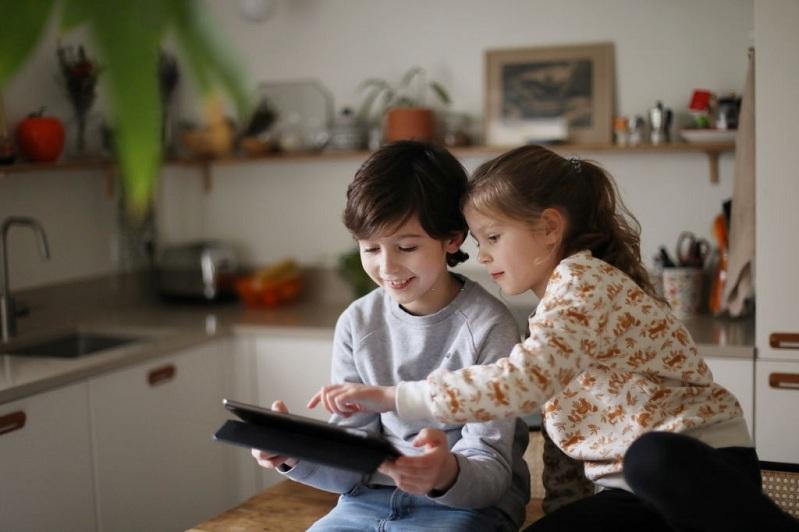
When your baby begins to walk, they start to explore their surroundings curiously, and technological gadgets like mobile phones, tablets, and iPhones draw their attention most. Some parents do not stop letting their kids spend time on the screen, while others may outright ban it.
From toddlers to school-going children, everybody spends some hours of a day on the screen. However, is it harmful to children, and how much is too much? According to a Canadian study, letting a toddler spend lots of time using screens may delay their development of communication and socializing skills.
Research has found that children should not spend time on screens at all until they turn 18 months. A recent study has found that the screen time was about 17 hours a week at the age of two that went up to around 25 hours a week at the age of three and decreased to about 11 hours a week when they started primary school. Studies suggested that increased viewing can delay the development of other skills in them.
How could it affect their growth?
When your child is observing the screen, they will miss other opportunities to master their skills. It can limit their social interaction ability and perform activities like running, climbing, and other physical skills.
Even though more research is to be done to prove spending time on screens is entirely harmful to kids, experts suggest that it should not interlope face-to-face conversation and family time.
How much time is too much
It is most important to know when you should stop your children from using screens. The recent study has made no recommendation about when there should be a pause. However, there are some guidelines about the use of screens for children up to two years. There should be an outright ban on on-screen usage for children younger than 18 months. Parents of children aged 18 to 24 months should choose high-quality programs and watch with them to understand what they are watching. Children two to five years of age should not be allowed to spend more than an hour a day on screens, and they must watch high-quality programs. Children who are six-years-old or over should ensure that their screen time does not come in the way of their sleep and physical activity.
Not all Screens will negatively affect children’s development
When it comes to the development of children, reading and other physical activities are essential, but children are growing in a world where screens are ubiquitous. Research has shown that children are more tempted to use screens without realizing that they are compromising skills that they could learn at that age.
Screens are not bad, but the way they are using screens should raise alarm bells. Screen time can lead to reduced physical activity. It is also linked to less family time and sleep in adult children. Digital entertainment has made it worse. Adolescents spend most of their time on tablets and mobile phones to entertain themselves.
Research has also shown that not all types of TVs are the same, nor are they harmful to the growth of your children. Some producers stream educational content on the TV that undoubtedly helps improve behavior and cognitive skills.
Such kind of educational content can help children of three to five years of age. Educational TV is not wrong for your kids at all. It will help them improve their knowledge. A study has shown that children can learn a new word faster in person and over an interactive video call than conveyed to them passively on a screen.
Screens are bad if your kids are using them to play games that unfortunately contribute nothing to the growth of your children. In fact, they lock them up in a room for several hours, killing opportunities of stepping out and socializing with other kids.
Interactive screen time can be beneficial for your kids; for example, video calls with relatives, reading a story, and watching shows with your children. Screen time is being bad because most children do not use them for good reasons.
As both parents are working and stressfully manage between work and personal life, they often fail to pay heed to their children. As a result, children often spend time passively on screens. This is what is detrimental to the development of your kids.
Screen content may not build strong mental imagery
Research has shown that when you watch content on the screen, it engages only your eyes and ears, not other senses like touch and taste.
In research, when children of age three to nine-years-old were asked to close their eyes to imagine the last time they were in the swimming pool, they could not promptly and vividly recall how the water felt against the body, how it smelt, and how the floor was.
The lack of mental imagery was the issue among all participants – passive and active screen users. As a parent, you can increase the power of mental imagery in your child by encouraging pretend play. This is an excellent way to make them use all of their senses while reducing their reliance on screens. Many parents do not mind allowing their children to be in touch with screens and for that, they buy them new gadgets. Some of you do not hesitate to take out loans for the unemployed in Ireland. Studies have shown that toddlers should not interact with screens, and children aged 18-months-old and over should explore educational content.
Also read about:
Understanding Your Tax Payments for the Upcoming Year
How to Find Out How to Build Real Followers on Instagram
Top Ideas to Post on Instagram to Get More Followers








